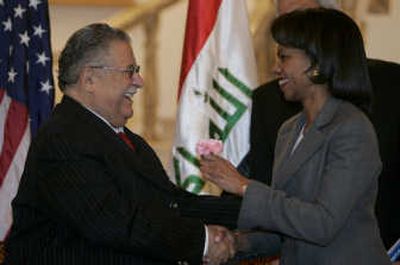Rice criticizes al-Sadr on surprise Iraq visit

BAGHDAD – After long treating radical Shiite cleric Muqtada al-Sadr and his Mahdi Army militia gingerly, U.S. Secretary of State Condoleezza Rice ridiculed him Sunday as a man who asks his followers to fight to the death while he resides in safety in Iran.
Al-Sadr, who on Saturday threatened to declare a formal end to a cease-fire he announced in August, was also described by U.S. Ambassador Ryan Crocker as running a weakened military organization.
The taunting comments came during an unannounced visit by Rice to the Iraqi capital, in which she praised an ongoing nationwide crackdown by Prime Minister Nouri al-Maliki and his government security forces on armed militias. Most of the fighting has been directed at elements of al-Sadr’s militia, but until Sunday, American officials had taken pains to separate al-Sadr from his more radical followers, who the U.S. claims receive training and arms from Iran.
At least 700 people have died in the fighting in southern Iraq and Baghdad since the government offensive was launched last month.
American officials had long credited al-Sadr’s truce for helping to reduce sectarian violence since September.
But on Sunday, Rice jettisoned the delicacy with which other senior American officials have tiptoed around al-Sadr in the last two years, lashing out against the firebrand cleric.
“He is still living in Iran,” she said. “I guess it’s all-out war for anybody but him. His followers can go to their death and he will still be in Iran.”
Al-Sadr on Saturday warned he would launch an open war if the Iraqi government, backed by U.S. forces, did not freeze its operations against his militia in Baghdad and the southern port of Basra. Al-Sadr did not respond to Rice’s comments Sunday.
If al-Sadr calls for all-out war, it is unclear what would happen. If his militia proved stronger than U.S. and Iraqi government officials evidently believe, he could paralyze southern Iraq and Baghdad and prove a major obstacle to further U.S. troop reductions.
Rice on Sunday singled out the Mahdi Army for the troubles in Basra and Baghdad, where in the past American officials have been at pains to separate al-Sadr from his more radical followers, which U.S. officials usually refer to as “special groups.”
The Mahdi Army “and particularly special groups … had completely destroyed law and order in Basra and somebody had to deal with that,” Rice said. Rice said the fight against al-Sadr’s militia was proof of a new political will among ruling Shiite and Kurdish parties. Iraq’s largest Sunni political bloc, which left the government last summer, has indicated it might soon return and has backed the current offensives in Baghdad and Basra.
In turn, al-Sadr supporters have charged that his rivals in the government want to weaken his movement ahead of provincial elections in October. They accuse the government of disregarding al-Sadr’s efforts to weed out his militia’s bad elements by ordering a cease-fire since August that was shattered in all but name when al-Maliki kicked off his Basra campaign March 24.
“Without the al-Sadr participation in the political process, there wouldn’t be any government and there wouldn’t be any political process,” said parliament member Haidar Fakhrildeen.
Rice’s trip Sunday to Baghdad’s high-security Green Zone, where the Iraqi government and U.S. Embassy are located, was punctuated by at least three rocket attacks from eastern Baghdad, an al-Sadr stronghold. One explosion came minutes before she unveiled a plaque to U.S. Embassy employees who had died in Iraq.
During Rice’s visit, Crocker also belittled al-Sadr’s war threat, describing him as weaker than in 2004 when his militia waged two major revolts against the Americans.
Crocker said the mainstream Shiite population had turned on the Mahdi Army’s hardliners and would not support them in an uprising. “I think their capabilities are certainly less than they used to be,” Crocker said.
Both Rice and Crocker said the al-Sadr movement could participate in the political process if they gave up their arms.
As Rice met with al-Maliki and other senior partners in the Iraqi government, the Mahdi Army battled with Iraqi and U.S. forces in east Baghdad’s Sadr City district. Witnesses said fighting ocurred in several residential areas and a U.S. helicopter fired in at least one incident. A roadside bomb exploded as a U.S. Army convoy passed through the eastern neighborhood of Baladiyat, leaving one civilian dead and another wounded, police said. The Army later said the blast had killed a child.
A mortar round landed by a police checkpoint in another area near Sadr City, wounding four officers, while a second roadside bomb in east Baghdad injured three civilians, police said.
The U.S. military confirmed that it had killed seven suspected militia fighters in airstrikes and gunbattles Saturday night.
U.S. soldiers raided a fire station in Sadr City early Sunday and seized a dozen AK-47 assault rifles, one PKC machine-gun and some ammunition.